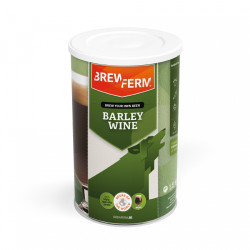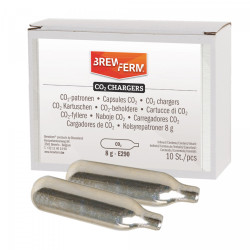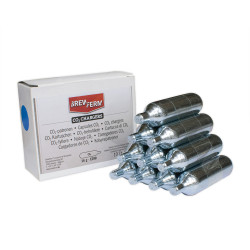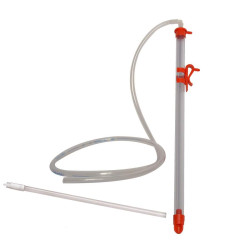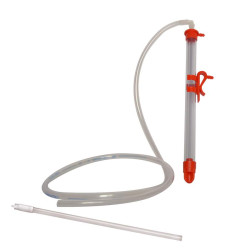Brewferm English IPA Beer Kit
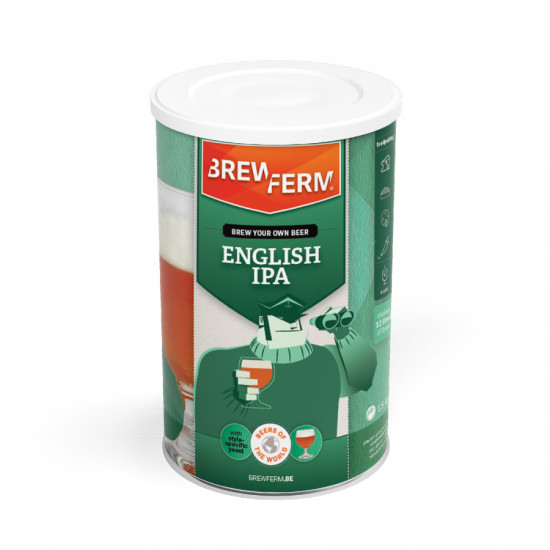
- Stock: In Stock
- Code: GEB2731
Available Options
Brew your own English IPA with authentic brewer's yeast
The Brewferm range of Home Brew Beer Kits includes a range of
true-to-style Belgian Beers with some additional popular English
recipes.
The Brewferm Home Brew Beer Kits come as a single can
with easy-to-follow instructions under the cap and the proper brewers'
strain of yeast. You will need to add some extra fermentable, which is
usually 1kg of Dextrose Brewing Sugar.
Brew quality beer at
home easily with a Brewferm Beer of your choice. The hard work has been
done for you, and it's as simple as rehydrating the malt extract by
adding water and pitching the yeast. The quality of these home brew beer
kits is far from novelty, and they will be sure to deliver impressive
results.
A traditional IPA. Light amber-coloured and full of flavour with a spicy, bitter finish.
original gravity: 1065
expected gravity: 1017
ABV: 6.5%
for 12 litres of beer
IBU: 42 - 52
color: amber
yeast: New world Lager
The
Brewferm range is perfectly suitable for beginners to home brewing
beer. Check out just how easy they are to make in the GEB Video:
Delivery from Get Er Brewed
Your order will be dispatched from our warehouse and delivered by your choice of courier service that we provide.
Please click on the link below for more information on the available delivery services.
DELIVERY INFO
Once your order has been packed and is ready for delivery, our team will inform you of the dispatch date and the delivery reference number.
Weight Limits:
The weight limit is 30kg for DPD and 70kg for DHL, either by volumetric or actual, whichever is greater. (Remember, a large packing box weighs 1kg of that total weight).
For products or orders over these weights, the PALLET SHIPPING option is available.
We
try our utmost to package professionally and keep your items as safe as
possible. If your parcel arrives damaged, please ensure you sign for it
as received damaged and send us a brief description of what has happened
and a few pictures so we can provide the courier with feedback to
resolve.
For any more information, please contact us at 0800 2289 433 or send an email to [email protected].
Instructions for Brewferm® beer kits
Read these instructions carefully and in full before you start. The preparation process is essentially the same for all beer types, but the amounts of sugar and water are different for the various types.The amounts for each type are shown in the WATER & SUGAR CHART. Brewferm® beer kits are very easy to use. The most important thing is to ensure that everything you use is absolutely clean.
Procedure
1. Remove the lid and the yeast.
2. Open the can and place it in a kettle filled with warm water (+/- 40°C) so the malt extract takes on a more fluid consistency.
3. Pour the contents of the can into your clean fermentation bucket.
4. Rinse the can well with 1 l of warm water and add.
5. Dissolve the amount of SUGAR 1 in 2 l of warm water and add (if SUGAR 1 = 0 grams, just add 2 litres of warm water).
6. Mix everything thoroughly with a clean mash paddle or spoon.
7. Add cold WATER 1 and mix everything again.
8. Let the mixture cool down to approx. 20-25°C.
9. You can measure the specific gravity using a hydrometer if desired. The ideal value is shown on the label (Original Gravity) and in the table below.
10. Open the yeast and pour the contents of the packet out over the liquid.
Fermentation
11. Close the fermentation bucket and place the airlock on it, which you have filled with water to approximately halfway.
12. Set the bucket in a warm place that has as stable a temperature as possible (18–23°C) and leave to ferment for 7-10 days.
Bottling
13. Use a hydrometer to determine the specific gravity. Your beer is ready for bottling if:
• There is no more activity in the fermentation bucket and
• The measured SG is more or less equal to the expected SG (see chart) and
• The SG has been stable for 48 hours
Remark: To measure is to know; if you aren’t sure, wait 48 hours and measure again.
14. Siphon the beer into a clean fermentation bucket without stirring up the sediment.
15. Add 7 grams of sugar per litre to the beer for bottle-conditioned beer (if filling kegs, use 2.5 grams of sugar per litre).
16. Mix well. TIP: Dissolve the sugar in a little warm water and let it cool to room temperature.
17. After filling, seal the bottles with a crown cap or flip-top and keep at room temperature (18-23°C) to get the second fermentation started.
18. After ten days, move the beer to a cooler spot to ripen (6 to 8 weeks).
19. Open your beer, pour it and enjoy! Cheers!
Tips
• Everything must be absolutely clean! Use a cleaning product specifically intended for this purpose, such as Chemipro® OXI or PBW combined with Star San.
• To measure is to know. Each fermentation is a biochemical process, and is not an exact science. Don’t panic if your fermentation values aren’t identical to the values in the chart.
SAFETY PRECAUTIONS:
Observe the following rules to avoid the risk of exploding bottles or kegs:
• Use only pressure-resistant and reusable beer bottles free from scratches and cracks.
• Do not rely solely on a fixed fermentation time or the bubbling of the airlock. Always measure the initial and final density of the beer as described in the user guide.
• Never add too much sugar when bottling.
• During the second fermentation, store bottles and kegs in a separate, closed room, with a stable temperature and preferably not in busy areas.
• Never store filled beer bottles or kegs where they are exposed to direct sunlight.
WATER & SUGAR CHART
| Bottle Prime | Keg Prime | ||||||
| Volume | SUGAR 1 | WATER 1 | OG | FG | SUGAR 2 | SUGAR 2 | |
| Pilsner | 20 L | 1000 | 16 L | 1.042 | 1.004 | 7 g/l | 2,5 g/l |
| Belgian Dubbel | 9 L | 500 | 5 L | 1.07 | 1.01 | 7 g/l | 2,5 g/l |
| Winter Ale | 7 L | 0 | 3 L | 1.065 | 1.015 | 7 g/l | 2,5 g/l |
| Belgian Brown | 15 L | 1000 | 11 L | 1.06 | 1 | 7 g/l | 2,5 g/l |
| Cherry Ale | 12 L | 500 | 8 L | 1.053 | 1.01 | 7 g/l | 2,5 g/l |
| Strong Blond | 9 L | 500 | 5 L | 1.075 | 1.012 | 7 g/l | 2,5 g/l |
| Premium Pils | 12 L | 500 | 8 L | 1.053 | 1.005 | 7 g/l | 2,5 g/l |
| Flemish Brown | 12 L | 800 | 8 L | 1.06 | 1.01 | 7 g/l | 2,5 g/l |
| Belgian Wit | 15 L | 750 | 11 L | 1.052 | 1.005 | 7 g/l | 2,5 g/l |
| Wheat Tripel | 9 L | 500 | 5 L | 1.075 | 1.015 | 7 g/l | 2,5 g/l |
| Belgian Tripel | 9 L | 500 | 5 L | 1.075 | 1.008 | 7 g/l | 2,5 g/l |
| Raspberry Ale | 12 L | 500 | 8 L | 1.053 | 1.01 | 7 g/l | 2,5 g/l |
| Special Belge | 12 L | 500 | 8 L | 1.055 | 1.01 | 7 g/l | 2,5 g/l |
| Dunkel Bock | 12 L | 500 | 8 L | 1.054 | 1.005 | 7 g/l | 2,5 g/l |
| English IPA | 12 L | 600 | 8 L | 1.065 | 1.017 | 7 g/l | 2,5 g/l |
| Imperial Stout | 9 L | 500 | 5 L | 1.07 | 1.015 | 7 g/l | 2,5 g/l |
| Barley Wine | 9 L | 500 | 5 L | 1.068 | 1.01 | 7 g/l | 2,5 g/l |
| Belgian Saison | 15 L | 500 | 11 L | 1.044 | 1 | 7 g/l | 2,5 g/l |
| English Porter | 12 L | 500 | 8 L | 1.055 | 1.005 | 7 g/l | 2,5 g/l |








